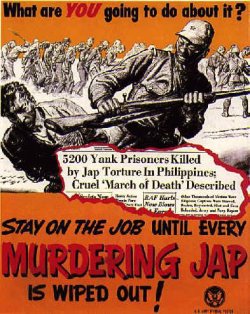Damn the facts–full speed ahead!
As far as I can tell, Jamie Kirchick, assistant editor for The New Republic,[*] has devoted most of his young professional life to becoming exactly the sort of bright boy at the The New Republic whom Randolph Bourne had in mind when he wrote The War and the Intellectuals, and who, decades later, would make the best and the brightest
into a bitter national joke. In any case, here’s something from his latest, a TNR blog post on Barack Obama’s relationship with Rev. Jeremiah Wright, and his recent speech on race:
Finally, what concerns me most about the Wright controversy isn’t the Pastor’s racist statements or even his unhinged views of Israel. I don’t think Obama agrees with any of that nonsense. What concerns me is the sort of comment that Wright made about Harry Truman’s ending World War II, that
We bombed Hiroshima, we bombed Nagasaki and we nuked far more than the thousands in New York and the Pentagon, and we never batted an eye.This smacks of the Howard Zinn/Noam Chomsky/Nation magazine wing of the American left that Democrats serious about this country’s security (and winning in November) should not want within 100 miles of the next administration.— James Kirchick, The Plank (2008-03-21): Thoughts on a Speech
Let’s set aside, for the moment, Rev. Wright’s confusion about personal pronouns. I didn’t bomb Hiroshima or Nagasaki, and I don’t think that he did, either. But that’s apparently not what Kirchick has a problem with. What he has a problem with is what such statements about the U.S. government smack of.
But, Mr. Kirchick, no matter what it may smack of
to mention it, isn’t it true that the United States Army bombed Hiroshima?
No matter what it may smack of
to mention it, isn’t it true that the United States Army bombed Nagasaki?
No matter what it may smack of
to mention it, isn’t it true that the atomic bombings of Hiroshima and Nagasaki killed somewhere around 210,000 civilian men, women and children — about 70 times the number of civilians killed in the attacks on the World Trade Center and the Pentagon?
As far as I can tell, nothing that has provoked Jamie Kirchick’s outrage here is actually, you know, false. Perhaps he thinks that these are facts which it is rude to mention in public. But if being taken for serious
about this country’s security
(which is TNR-speak for this government’s wars
) requires not mentioning them–that is, if being taken for serious
requires silence or dissembling about the deaths of hundreds of thousands of people for the sake of a shared vision of American power
, then it is well worth asking just who the hell these assholes are who we’re supposed to prove our seriousness
to. And what their notion of seriousness
really amounts to. And why anyone should think she has to prove a damned thing to them.
(Via David Gordon, via Lew Rockwell 2008-03-23.)
* You may remember Kirchick from an earlier piece he published in TNR during the late unpleasantness. !!!@@e2;2020;a9;

